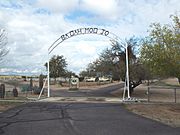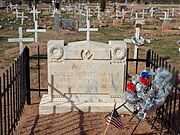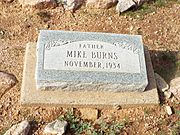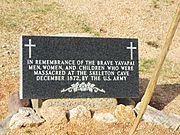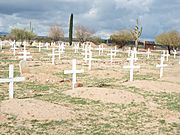Fort McDowell Yavapai Nation facts for kids
| A'baja (Havasupai–Hualapai) | |
|---|---|
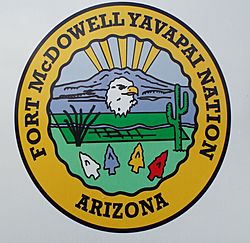 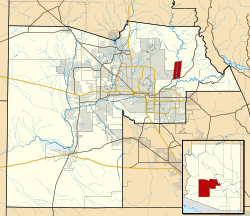
Location of Fort McDowell Yavapai Nation in Maricopa County, Arizona
|
|
| Total population | |
| 900 | |
| Regions with significant populations | |
| Languages | |
| Yavapai (three dialects of Upland Yuman language), English | |
| Religion | |
| traditional tribal religion, Christianity | |
| Related ethnic groups | |
| other Yavapai people, Havasupai, Hualapai, Mohave, Western Apache |
The Fort McDowell Yavapai Nation is a special community of the Yavapai people. Their name in the Yavapai language is A'ba:ja. This community is a federally recognized tribe, which means the United States government officially recognizes them as a Native American nation.
They live on an Indian reservation in Maricopa County, Arizona. This area is about 23 miles (37 km) northeast of Phoenix.
Contents
History of the Fort McDowell Yavapai Nation
The Fort McDowell Yavapai Nation reservation was officially created on September 15, 1903. This happened through an executive order, which is a special rule made by the President. The land was taken from the traditional lands where the Yavapai people had lived for a long time.
The reservation covers about 24,680 acres (100 km²). This land was once part of the Fort McDowell Military Reserve. This military base was important during the Apache Wars, which were conflicts between the U.S. Army and some Apache groups.
The first people to live on the reservation were the kwevikopaya, or Southeastern Yavapai. They came from the nearby Mazatzal-Four Peak and Superstition Mountains areas.
Protecting Their Land
In the 1970s, there was a plan to build a large dam. This dam would have been built where the Verde and Salt Rivers meet. Building this dam would have caused many problems for the reservation.
The community voted not to sell their land for the dam project. Because of their decision, the dam, which would have been called the "Orme Dam," was never built. The Fort McDowell Yavapai Nation celebrates this important victory every November. They hold a rodeo and a pow wow, which is a gathering for Native American dancing and singing.
The Casino and a Big Protest
After a law called the Indian Gaming Regulatory Act was passed in 1988, the tribe built a casino on their reservation. This law allowed Native American tribes to operate gaming businesses.
In 1992, agents from the Federal Bureau of Investigation (FBI) tried to take away the casino's gaming machines. This was part of similar actions at other Native American reservations across the country.
However, the Yavapai tribe members did not let this happen easily. They organized a protest. They used cars, trucks, and even large earth-moving machines to block the roads. This stopped the FBI trucks from taking the machines away.
Eventually, the tribe reached an agreement with Governor Fife Symington. This agreement allowed the casino to stay open. In 2018, the tribe began building a new, larger casino, which opened in 2020.
Life and Economy on the Reservation
The Fort McDowell Yavapai Nation is close to other towns like Fountain Hills and Rio Verde. The reservation's economy is also connected to nearby cities like Mesa, Scottsdale, and Phoenix.
The tribe runs several businesses that help their community. These include their own gas station, a large sand and gravel company, and a farm. The Fort McDowell Casino is also a major part of their economy.
Other businesses on the reservation include the Wekopa Resort and Conference Center. They also operate the Poco Diablo hotel, the Wekopa Golf Course, and Fort McDowell Adventures, which offers fun activities.
Important People and Places
The area where the reservation is located was the birthplace of a famous Native American activist named Carlos Montezuma. He helped start the Society of American Indians, an organization that worked for Native American rights.
Ba Dah Mod Jo Cemetery
The Ba Dah Mod Jo Cemetery is also known as the Fort McDowell Yavapai Nation Tribal Cemetery. It was originally a burial place for soldiers who died while stationed at Fort McDowell.
Later, the remains of the non-Native American soldiers were moved to another cemetery in San Francisco. This happened after the land was given to the Yavapai Nation. The cemetery is now a sacred place for the Yavapai people.
- Ba Dah Mod Jo Cemetery
Images for kids
 | John T. Biggers |
 | Thomas Blackshear |
 | Mark Bradford |
 | Beverly Buchanan |


